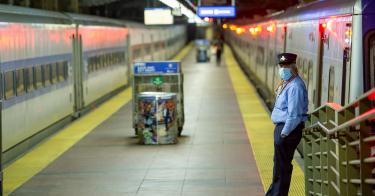Some lawmakers realized that sending an extra $600 per week to everyone who receives unemployment benefits would cause problems. That’s why they tried to cap benefits at 100% of each workers’ wages.
They didn’t get the cap. But they were right.
Heritage Foundation economist Drew Gonshorowski and I have now modeled the impact of the “bonus” payment provisions and concluded that it will be even more damaging than those prescient lawmakers imagined.
Over the last four weeks, about 26 million people have filed for unemployment insurance, bringing the unemployment rate close to 20%. We estimate that, at the peak of unemployment in May, the extra $600 per week could be responsible for 13.9 million of the total unemployment claims. With more workers on the sidelines and for longer periods of time, this will reduce the nation’s output by up to $1.49 trillion between May and September.
In normal times, unemployment typically provides about 50% of previous earnings. But these are not normal times. It makes sense to temporarily increase benefits because this is a temporary health crisis in which tens of millions of workers have lost their jobs through no fault of their own.
But it doesn’t make sense to create a system in which a majority of Americans can make more without a job than by remaining on the job.
Instead of bridging the gap, excessive unemployment payments will only increase the breadth and depth of the economic downturn.
This bonus benefit threatens to negate much of what Congress has done to try to keep workers connected to their employers such as the Paycheck Protection Program, mandated paid sick and family leave and the Employee Retention Tax Credit.
Keeping workers employed, even if they are temporarily not working or working less, is incredibly beneficial. For starters, it means workers can keep their health insurance. And if tens of millions of workers and millions of employers aren’t scrambling to find new jobs and hire and train new employees, society will be able to reopen more quickly once it’s safe to do so.
Unfortunately, we’ve already heard of employees who are choosing unemployment benefits over employment, leaving business owners unable to provide the goods and services they would like to offer.
Typically, workers can’t just choose unemployment benefits—they have to actually be laid off. But under the CARES expanded eligibility, workers can quit their jobs on account of COVID-19 and receive unemployment benefits.
Steve Anthony, CEO of Anthony Timberland’s pine mills in Arkansas, said of the $600 additional benefit: “As soon as I saw that, I immediately knew it was going to be a major problem.” He noted that the fact that workers could make more money unemployed than employed led to “an uncommitted, unhappy workforce” that was less productive. After polling workers about whether they wanted to work or collect unemployment, the company decided to lay off 200 workers and cut production by half at one location.
Harlan, KY, coffee shop owner Sky Marietta explained how she and her husband had to stop serving customers—primarily health care workers—because they couldn’t compete with unemployment. “The very people we hired have now asked us to be laid off,” Marietta wrote. “Not because they did not like their jobs or because they did not want to work, but because it would cost them literally hundreds of dollars per week to be employed.”
Marietta is right. And actually, many of workers could lose thousands of “free” dollars by remaining employed. Workers in the bottom 25% of earners (those making about $15.50/hour or less) stand to lose $5,000 or more over the course of the four months that the $600 bonus unemployment benefits are available.
With those added benefits available through July 31, it’s going to be hard to get people to come back to work—especially because the bonus benefit creates the biggest incentive for lower-wage workers to stay home. And some of the hardest-hit industries of restaurants, travel and hotels tend to employ lower-wage workers. As restaurateur and Top Chef judge Tom Colicchio said: “They’re not going to come back to work because unemployment is too attractive.”
With up to 14 million jobs on the line and as much as $1.5 trillion in lost output, Congress should fix this disastrously flawed provision by capping total unemployment benefits at no more than 100% of workers previous wages.
Moreover, Congress should not extend the additional unemployment benefits beyond their current expiration on July 31. Economic studies and common sense attest this would only further prolong the downturn and could lead to shortages in goods and services, including those needed to help combat COVID-19.
This piece originally appeared in the Tyler Morning Telegraph



